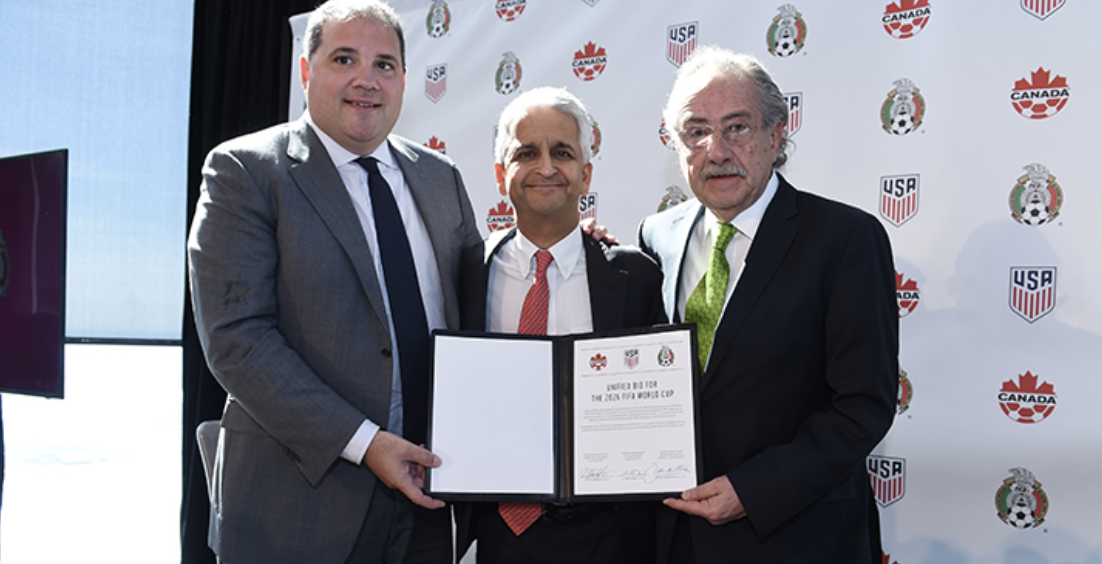By Andrew Warshaw
April 11 – An expanded tournament to 48 teams, Gianni Infantino’s encouragement for a return to co-hosting and the re-establishment of rotation. It has all played very nicely into the hands of CONCACAF whose three biggest members have, as expected, now officially announced their intention to bid for the 2026 World Cup.
“We look forward to welcoming the world after what we hope is a successful bid,” said U.S. Soccer president Sunil Gulati (pictured centre) after his country, Mexico and Canada formally gave notice of their widely anticipated plans at a jointly staged press conference at the World Trade Centre in New York.
Giving details of the bid for the first time, Gulati said the initial plan was for 60 of the 80 games to be played in the US, with Canada and Mexico hosting 10 each. All matches from the quarter-finals onwards would be in the US which hosted in 1994.
If that sounds a somewhat lopsided arrangement, Gulati hinted that both Mexico – which has staged the finals twice – and Canada would ideally have liked more of the pie. The new-look tournament will comprise an initial round of 16 three-team groups, with 32 qualifiers going through to the knockout stage.
“I think it’s safe to say both countries would have liked to host more. In the end, it was a discussion, a negotiation, but a very friendly one,” Gulati explained.
Following the presentation, Gulati, Mexican federation president Decio de Maria (pictured right) and Canada Soccer Association boss Victor Montagliani (pictured left), who is also CONCACAF president, signed a memorandum of understanding to join forces for the first ever three-way hosting and the first joint staging since South Korea and Japan in 2022.
Given that Asia and Europe are restricted from bidding for 2026 under the rules, anyone thinking of attending 2026 can virtually make plans now unless there is a surprise challenger.
Morocco is the most likely candidate but would need an African co-hoster because of the sheer scope of an 80-game tournament (up from 64) and couldn’t get near the facilities and financial might of North America and Mexico. Technically FIFA will draw up a shortlist for its 211 member nations to vote in 2020 but that may end up being a formality.
“A World Cup in North America, with 60 games in the United States will be by far the most successful World Cup in the history of FIFA in terms of economics,” Gulati said.
“We’ve got 500 million people in these three countries. This will be an extraordinarily successful World Cup on financial and economic grounds.”
And, crucially, it apparently has Donald Trump’s support despite his contentious plans for a border wall to stem the flow of illegal immigrants from Mexico.
“We outlined through someone who was communicating directly with the president what we wanted to do, and the message we got back was that the president encouraged us to go forward … said he was supportive of it and very pleased that Mexico was a part of it,” Gulati told reporters.
“To have governmental support is a critical part of a bid.”
Contact the writer of this story at moc.l1745210616labto1745210616ofdlr1745210616owedi1745210616sni@w1745210616ahsra1745210616w.wer1745210616dna1745210616

